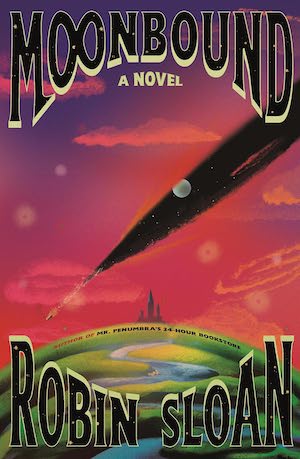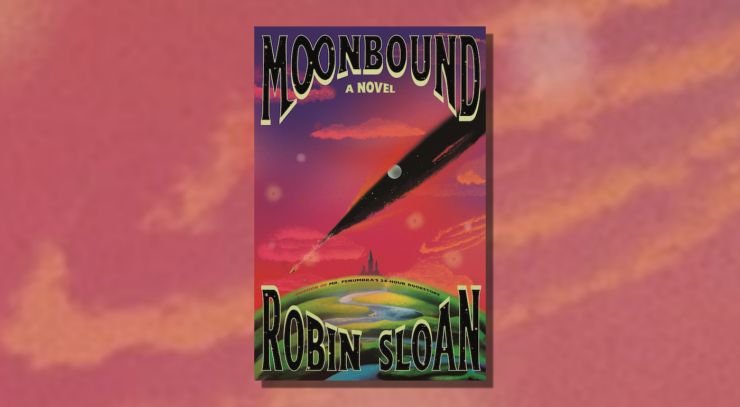We’re thrilled to share an excerpt from Moonbound, a new science fiction novel by Robin Sloan, out from MCD on June 11th.
It is eleven thousand years from now… A lot has happened, and yet a lot is still very familiar. Ariel is a boy in a small town under a wizard’s rule. Like many adventurers before him, Ariel is called to explore a world full of unimaginable glories and challenges: unknown enemies, a mission to save the world, a girl. Here, as they say, be dragons. But none of this happens before Ariel comes across an artifact from an earlier civilization, a sentient, record-keeping artificial intelligence that carries with it the perspective of the whole of human history—and becomes both Ariel’s greatest ally and the narrator of our story.
CITY OF TRANSFORMATIONS
November 17, 13777, to February 28, 13778
Rath Varia was a city of transformations!
A vast sprawl of structures screened everywhere by scaffolding; a city permanently under construction. Streets were ripped up, buildings knocked aside to make way for new routes, whole new theories of interconnection. Residents relocated cheerfully. Sometimes they hauled their homes with them. On the evening that he entered the city, Ariel encountered an elegant townhouse being dragged along the riverfront by a raucous team of volunteers, bound for a new address.
The riverfront, which was plural: the River Variable ran wide and slow, a muddy braid that shifted its course constantly. The river drew some small fraction of its volume from the cold stream that rushed through Sauvage: a thread of connection.
City and river flexed and surged together. Neighborhoods were lost in the flow, abandoned without angst, reclaimed when the river shifted again. On the day Ariel arrived, Rath Varia boasted thirty-one bridges. The routes across the city were always changing.
On that first night, after an hour of nervous circling, Ariel approached the food cart, received a portion of potstickers— “with the city’s welcome to walkers one and all, sponsored by the guild of trash-pickers”—and asked the vendor, “Where might I find a room?”
“There are places to stay all around you. Choose one.”
Ariel gazed up at the apartment blocks, three and four and five stories tall. “In any of these buildings?”
“Maybe not those. This is a popular neighborhood, so close to the Rath-road. Oh, but there’s a place around the corner.” The vendor gestured. “They tore down half, got distracted. Plenty of rooms unclaimed there, last I heard. Choose one! That’s how it works in Rath Varia.”
Ariel located the building, unmistakable with half its facade missing, exposing empty rooms—a vertiginous cutaway. He was afraid it might be spooky or derelict inside, but many of the rooms still intact were inhabited, with names stenciled on the doors, plants set out in the hall. On the third floor, an open door brought him into an empty room, bare and dusty, with a tall window that faced the river. He trod a circle in the dust. Was this it? Could it be his, as simple as that? He pulled the door closed. Yes. Apparently so.
Ariel was home.
* * *
He slept on the floor with his jacket for a pillow and woke up sore and sneezing. In the hallway, he spied a woman watering her plants, and asked where he might acquire a bed and a broom. A broom the woman was happy to lend; a bed, she said, could be obtained the same place anybody got anything in Rath Varia.
In the city’s center was a huge open facility, roughly circular, into which trash flowed: all those trucks he’d seen on the road, and trucks from other roads, all jostling to deliver their cargo.
It was the recycling center. They called it Matter Circus.
Buy the Book


Moonbound
If other cities in history had at their hearts financial districts or imperial palaces, Rath Varia beat its blood through this place: a vast arena of material, jumbled when it arrived but quickly sorted into neat lanes, metal and glass and stone, wire and screw and hinge. Basins overflowed with paint scraped from walls.
Paint: scraped from walls.
Even in the refinement of the cooperativos, I had never seen anything like this recycling center.
Matter Circus was divided into zones as big as neighborhoods.
There was a zone for materials nearly raw, visible as low hills of pulverized glass and craggy peaks of fine-ground stone.
There was a zone where elements of architecture were arrayed for perusal: a field of windows, a forest of doors.
There was a zone for electronics, their tiny components plucked out and presented in orderly gradients of function, voltage, rarity.
There was a compost yard, reeking of sweet rot.
There was a zone for useful stuff, like a resale shop scaled to stadium proportions. Ariel saw a heap of candle holders; a thicket of immersion blenders; and a mound of, surprise: Stromatolites, just like his. The little game systems had once been very popular with someone, somewhere, at some time. Here they were piled like oyster shells.
Along the perimeter of the useful zone, he found a large and diverse collection of beds. Some were grand, others inscrutable, made for different kinds of bodies. One was small, fitted with a simple mattress.
Handcarts were strewn throughout the recycling center, so Ariel took one, but he struggled in vain to lift the bed into place. A burly man whose muscles showed through translucent skin strode quickly to his side. This was Caradoc, employed by Matter Circus to assist people like Ariel with masses like these.
At the recycling center’s gates, he was halted by a voice that blared through the horn of a tinny loudspeaker: YOU. WITH THE BED.
This was the voice of Comptroller Cob, who oversaw the operations of Matter Circus from many and various vantage points. Cameras protruded on stalks throughout the facility, multiply lensed, employing wildly different systems of photoreception. All were monitored by Comptroller Cob. Whether he was a man or a robot or a sentient thicket of blenders, no one could say.
YOU. WITH THE BED. WHAT’S THE NAME ON THE ACCOUNT?
Ariel searched for the source of the voice. Failing, he confessed into the air that there was no account.
WELCOME TO THE CIRCUS. A FINE SELECTION. BUT YOU’LL NEED SOMETHING ON YOUR BALANCE, IF YOU WANT TO TAKE IT WITH YOU. READ THIS.
A previously unnoticed thermal printer screeched to produce a scroll of orientation instructions. Ariel saw the facility with fresh eyes; the printers poked out everywhere. The many tongues of Comptroller Cob.
The scroll explained that Ariel could achieve a positive balance in one of two ways. He could work, or he could deposit matter.
Working was tough business. Easier to head out into the wild and dig up some treasure, which is to say, some trash.
Ariel inventoried his possessions. He had the heater, still fully charged; the twine; his little knife; the Stromatolite. The game system he presented speculatively.
Comptroller Cob rejected this. HAVE YOU SEEN THE PILE?
A camera zoomed to inspect Ariel’s other possessions.
NICE TWINE, said Comptroller Cob.
“This?” Ariel said, holding up the spool.
VERY NICE. I’LL TAKE IT. DEAL?
It was definitely a deal. Ariel placed the twine into a nearby bin, and a different printer screeched, producing his first account statement. The balance, expressed in both kilograms and megajoules, seemed absurdly large.
I LIKE A GOOD TWINE, explained Comptroller Cob. NORTHERN TWINE. AUTHENTIC.
Piece by piece, Ariel built a life. He returned again and again to the recycling center, first because he needed a lamp or a towel and then because it was the place he knew best; he felt comfortable and anonymous in its busy flow. He wandered between piles of material. He learned Caradoc’s name, and greeted him whenever he saw him. The burly helper always nodded hello.
Adjacent to Matter Circus were the manufactories, insatiably hungry for material from the recycling center. There were foundries and kilns, woodshops and upholsterers. More than anything, there were clothiers, ravenous for every kind of textile. Long streets were curtained on both sides with their offerings. Some had the look of homespun hodgepodge; others were so subtly reconstructed they would have earned applause on the runways of the Anth.
The clothes Ariel had worn out of Sauvage were in tatters. From a clothier of basic work attire, he acquired two shirts and a single pair of pants in the wide-legged style currently popular in the city. He began to say he would debit his balance of matter, but the clothier, eyeing the weave of his ruined clothes from far-off Sauvage, suggested: “Consider a trade?”
Ariel traded everything but the jacket—never that—and strutted out of the shop having never felt so fashionable, or indeed aware that fashion was an option. By the following week, his new pants were hopelessly passé, but Ariel still liked them.
He learned that in Rath Varia, no one would ever go without food and shelter; these were always in surplus, freely given. The bathhouses were open to everyone. Beyond those essentials, any frivolities required a balance of matter.
When Ariel’s balance dwindled, Comptroller Cob agreed to let him work—YOU’RE NOT GOING TO LIKE IT—sending him scurrying into the piles to retrieve obscure requests, a service for which the boy received a steady allowance of walking-around matter. This, in turn, paid for delicacies in the city’s coruscating night market.
All the food was new to him. It was served on small earthenware plates, or in tiny earthenware bowls; everything was designed to be eaten in two or three bites, ideally without breaking your stride. Finished, an eater would throw their dish against a wall, smashing it into pieces. The night market danced to the music of dishes destroyed.
The resulting piles of earthenware shards were swept up in the morning by roving emissaries of Matter Circus, taken straight to the kilns.
Ariel could not yet bring himself to smash his dishes; instead, he laid them among the shards.
The citizens of Rath Varia were as mutable as its structures. Every fascination floated on the breeze like a virus. People left homes, relationships, jobs. They left the city. They returned, unrecognizable.
Rath Varia supported an extravagant continuing education program, and people were constantly enrolling, constantly dropping out.
Walking through the night market, Ariel heard scraps of conversation in the breeze off the River Variable:
…pink? Oh, that will be wonderful. Maybe the back, too…
…thinking of switching to sculpture. I thought painting would suit me, but it’s so…
…was moving out. She told me she had come to the same conclusion! We laughed, then decided to move in together again. A new neighborhood, of course…
…yes! You should. You must!
At night, Ariel would lie awake in his bed, listening to the rumble of a dozen bands all practicing, up and down the street. In Sauvage, there had been only Jesse and his harp, and sometimes Elise on a resonant set of bongos. Ariel wondered what Kay was doing.
The boy lacked matter; he lacked information; he lacked a single friend. But he was working on all of these things, and might soon have put together a plan.
Might have, if Cabal hadn’t found him first.
Excerpted from Moonbound, copyright © 2024 by Robin Sloan.










